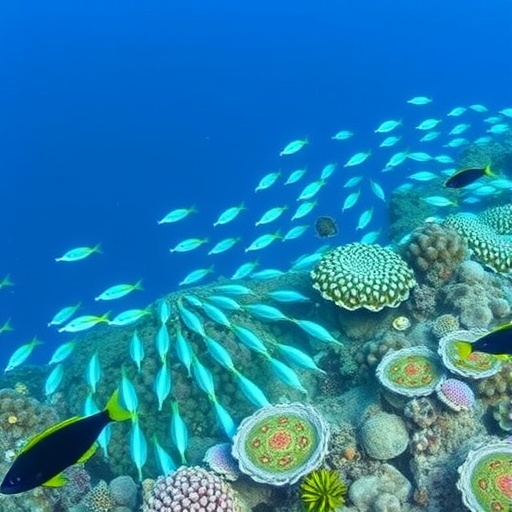Coral reefs, one of the most biodiverse ecosystems on the planet, are facing unprecedented challenges due to climate change and human activity. In the subtropical regions, the dynamics of these ecosystems are intricately linked to the complex interactions between various fish species and their surrounding environments. A groundbreaking study led by Hill et al. (2025) investigates how seascape connectivity—the spatial arrangement of marine habitats—plays a critical role in shaping fish functional diversity, enhancing ecosystem functioning, and bolstering resilience in coral reef systems. This research brings forth a paradigm shift in how we perceive marine biodiversity and its role in ecological stability.
As fish populate coral reefs across different geographical expanses, their functional diversity is not merely a result of evolutionary processes, but also of the connectivity of habitats that allows for genetic exchange and recolonization. The findings indicate that well-connected seascapes enhance the variety of roles fish play within these ecosystems, which in turn affects the overall health and productivity of coral reefs. Such an intricate balance underscores the importance of preserving marine corridors that facilitate this connectivity, thereby ensuring that a diversity of fish can thrive.
One of the central arguments put forth in the paper is the profound impact of seascape connectivity on the functional traits of fish. Specimens that occupy varied niches within the reef, from herbivores to predators, depend on the interconnectivity of their habitats for survival and growth. The interdependence seen in subtropical fish populations suggests that actions taken in one area can have cascading effects throughout the marine landscape, highlighting the broader implications for fishery management practices and conservation efforts.
Moreover, this research showcases compelling evidence that increased functional diversity among fish species enhances the resilience of coral reefs in the face of environmental stressors. Fish that perform vital ecosystem functions—such as grazing on algae, predating on other fish, and facilitating nutrient cycling—enable coral reefs to recover from disturbances more efficiently. The study emphasizes that protecting areas with high connectivity not only conserves fish diversity but also ensures the integrity of the reef structures, which are indispensable for marine life.
In mapping seascapes, scientists employed cutting-edge tools to analyze the physical and biological factors that affect connectivity among fish communities. Utilizing advanced spatial modeling techniques, the research team identified critical areas where conservation efforts could be most effective. These insights are invaluable for policymakers aiming to safeguard marine ecosystems, as they pinpoint regions that serve as corridors for migratory species or hubs for genetic diversity.
One striking aspect of the study is the stark reminder that the resilience of coral reefs is not solely dependent on the health of the reefs themselves but also on the interconnected web of marine life that thrives within them. This intricate relationship underscores the urgent necessity for a more holistic approach to marine conservation, which takes into account not only the species present but also their roles and relationships within the ecosystem. The implications for marine biodiversity management are significant, suggesting that failure to consider connectivity could jeopardize the health of coral reef ecosystems.
The researchers also underscored the importance of monitoring these seascapes over time. Continuous study is essential for understanding how shifts in climate and human activity further influence fish functional diversity and reef resilience. By implementing long-term monitoring programs, scientists can track changes in species populations and interactions, enabling adaptive management practices that respond to emerging threats. This proactive approach could prove crucial in mitigating the impacts of climate change and habitat degradation on coral reefs.
In conclusion, Hill et al.’s research sheds light on the critical relationship between seascape connectivity and the health of subtropical coral reefs. By demonstrating the role of fish functional diversity in ecosystem resilience, this study provides a compelling argument for the preservation of marine habitats that foster biodiversity. The integration of scientific insights into policy will be essential in protecting these vital ecosystems, which are not only a source of beauty but also a cornerstone of marine life. These results serve as a clarion call for renewed commitment to sustainable practices and conservation efforts that prioritize the interconnectedness of marine environments.
Future research is needed to further explore the nuances of how different species interact within these environments and how specific management strategies can optimize the benefits of connectivity. As we strive to understand and mitigate the impacts of global changes, the importance of ecological research in informing policy cannot be overstated. The study exemplifies how science can guide us toward caretaking our planet’s most precious resources, ensuring that future generations inherit a thriving marine environment.
The implications of this research extend far beyond academia, resonating with conservationists, policymakers, and the global community. It challenges us to rethink our approach to marine ecosystems and consider the interconnectedness of nature in our efforts to maintain biodiversity. By prioritizing seascape connectivity, we stand a better chance of sustaining not only the coral reefs but also the myriad species that call these underwater worlds home.
Subject of Research: Seascape connectivity and its effect on fish functional diversity and coral reef resilience.
Article Title: Seascape connectivity shapes fish functional diversity, ecosystem functioning and resilience in subtropical coral reefs.
Article References:
Hill, J.T., Olds, A.D., Gilby, B.L. et al. Seascape connectivity shapes fish functional diversity, ecosystem functioning and resilience in subtropical coral reefs.
Coral Reefs (2025). https://doi.org/10.1007/s00338-025-02734-6
Image Credits: AI Generated
DOI:
Keywords: Coral reefs, fish functional diversity, seascape connectivity, ecosystem resilience, subtropical marine environments.




